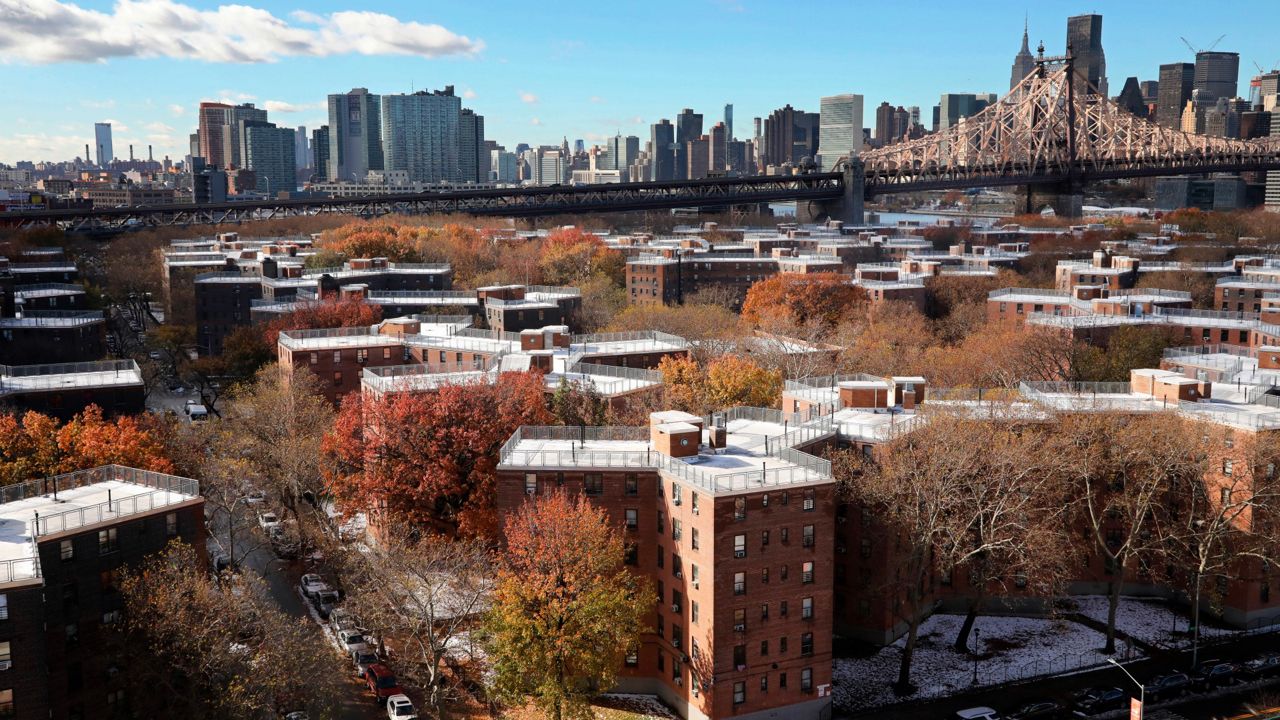Last winter, the city’s public housing authority installed mobile heating boilers outside the Woodside Houses development in Queens after its main boiler was damaged by flooding from Hurricane Ida.
Yet heating issues continued. One resident estimated in a January letter to NYCHA leadership that she had more than 100 outstanding complaints for lack of heat or hot water.
“We have suffered insufficient heat here in Woodside Houses for as long as I have lived here,” Pearline Clark, a 40-year resident, wrote in the letter, which she shared with NY1.
In a hearing Tuesday on NYCHA’s preparedness for the winter “heating system,” authority officials responded to questions from City Council members on their efforts to fix and replace the developments’ aging heat infrastructure. Officials said they were making progress in reducing the average time of heat outages and pushing for new innovation in apartment heating.h
Woodside has had “consistent and adequate heat” so far this winter, Keith Grossman, NYCHA’s senior vice president for operations support services, said at the hearing. But the authority has no timeline for fixing Woodside’s main boiler; a November test of its smokestack, to see if it could handle the heating apparatus being turned back on, failed, he said.
“We would all like to sit here and say, ‘There will be no outages,’” Grossman said of the authority’s portfolio of developments. “But that’s not possible. It’s Murphy's law. Things will break down.”
NYCHA’s 335 developments house about 535,000 residents, according to the authority, including families living in buildings that are managed by private firms. Its portfolio of buildings is aging, and facing an estimated $40 billion backlog in needed repairs.
Currently, officials said, they have billions secured to address issues with heating, including replacing hundreds of boilers by 2026. The average age of NYCHA boilers, officials said, is 26 years; the average expected useful lifespan of the boilers is 20 to 25 years.
NYCHA has increasingly relied on mobile boilers to provide heat, with 25 of its 33 mobile boilers currently in use.
Despite having a warmer than average winter last year, NYCHA saw its average time to fix a heat outage rise from 7.3 hours in 2020-2021 to 8.3 hours in 2021-2022, according to the October Mayor’s Management Report.
In general, the time needed to close a repair ticket submitted by a NYCHA resident has skyrocketed in recent years, taking an average of 49 days to resolve non-emergency issues, according to NY1 newsroom partner The City.
Grossman said that the authority has begun bringing average outage times into the “seven-hour mark,” and noted that the wait times remain under the 12-hour threshold required by the authority’s 2019 agreement with the U.S. Department of Housing and Urban Development.
“While we may not be yet where we need to be, we are making progress,” Grossman said.
Ongoing heat issues in some developments have continued despite upgrades, officials said. NYCHA is set to vacate a senior housing building at the Bronx River Houses, in the Bronx, after the building saw long stretches last winter without heat.
In that case, Grossman said, NYCHA installed a new boiler but saw outages caused by issues with the building's pipes, which have never been replaced.
“We are putting new boilers into original heat distribution equipment,” Grossman said. “Where we’re seeing our significant outages, they are related to distribution.”
Residents of the building are being offered units in nearby NYCHA housing, as well as vouchers for private apartments, officials said.
Council members at the hearing voiced their frustration with NYCHA’s widening infrastructure problems.
“You're fixing the boilers, but if we haven't actually invested in the infrastructure to get the heat out into the buildings in the development, then what's the improvement?” said Councilman Lincoln Restler, who represents a district in northwest Brooklyn.
Authority officials said they are looking to pilot programs for more energy efficient heating and cooling technology to address long-term HVAC issues.
Last year, the authority began an effort to encourage private technology companies to develop heating and cooling units that could be installed in individual apartments. Two companies are submitting pilot units, which will be tested out in the Woodside houses starting next year.
If the units are successful, NYCHA plans to purchase 30,000 to distribute across its developments, said Vlada Keniff, the senior vice president for sustainability.
The units, which use heat pump technology to push hot or cold air out of apartments, and can be installed as easily as a window air conditioner, could “get us away from talking about boilers and distribution issues forever,” Keniff said.
